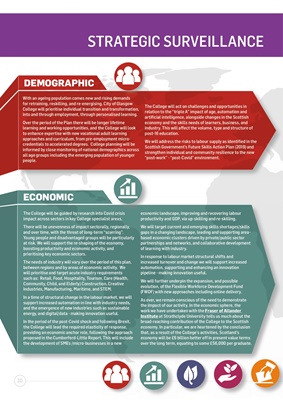
10
STRATEGIC SURVEILLANCE
With an ageing population comes new and rising demands
for retraining, reskilling, and re-energising. City of Glasgow
College will prioritise individual transition and transformation,
into and through employment, through personalised learning.
Over the period of the Plan there will be longer lifetime
learning and working opportunities, and the College will look
to enhance expertise with new vocational adult learning
approaches and curriculum, from pre-employment microcredentials to accelerated
degrees. College planning will be
informed by close monitoring of national demographics across
all age groups including the emerging population of younger
people.
The College will act on challenges and opportunities in
relation to the "triple A" impact of age, automation and
artificial intelligence, alongside changes in the Scottish
economy and the skills needs of learners, business, and
industry. This will affect the volume, type and structure of
post-16 education.
We will address the risks to labour supply as identified in the
Scottish Government's Future Skills Action Plan (2019) and
strengthen individual and community resilience to the new
"post-work" - "post-Covid" environment.
The College will be guided by research into Covid crisis
impact across sectors in key College specialist areas.
There will be unevenness of impact sectorally, regionally,
and over time, with the threat of long-term "scarring".
Young people and disadvantaged groups will be particularly
at risk. We will support the re-shaping of the economy,
boosting productivity and economic activity, and
prioritising key economic sectors.
The needs of industry will vary over the period of this plan,
between regions and by areas of economic activity. We
will prioritise and target acute industry requirements
such as: Retail, Food, Hospitality, Tourism, Care (Health,
Community, Child, and Elderly) Construction, Creative
Industries, Manufacturing, Maritime, and STEM.
In a time of structural change in the labour market, we will
support increased automation in line with industry needs,
and the emergence of new industries such as sustainable
energy, and digital/data - making innovation useful.
In the period of the post-Covid shock and following Brexit,
the College will lead the required elasticity of response,
providing an economic anchor role, following the approach
proposed in the Cumberford-Little Report. This will include
the development of SMEs /micro-businesses in a new
economic landscape, improving and recovering labour
productivity and GDP, via up-skilling and re-skilling.
We will target current and emerging skills shortages/skills
gaps in a changing landscape, leading and supporting areabased economic clusters
driven by private/public sector
partnerships and networks, and collaborative development
of learning with industry.
In response to labour market structural shifts and
increased turnover and change we will support increased
automation, supporting and enhancing an innovation
pipeline - making innovation useful.
We will further underpin the expansion, and possible
evolution, of the Flexible Workforce Development Fund
(FWDF) with new approaches including online delivery.
As ever, we remain conscious of the need to demonstrate
the impact of our activity. In the economic sphere, the
work we have undertaken with the Fraser of Allander
Institute at Strathclyde University tells us much about the
broad-reaching contribution of the College to the Scottish
economy. In particular, we are heartened by the conclusion
that, as a result of the College's activities, Scotland's
economy will be £6 billion better off in present value terms
over the long term, equating to some £56,000 per graduate.
ECONOMIC
DEMOGRAPHIC